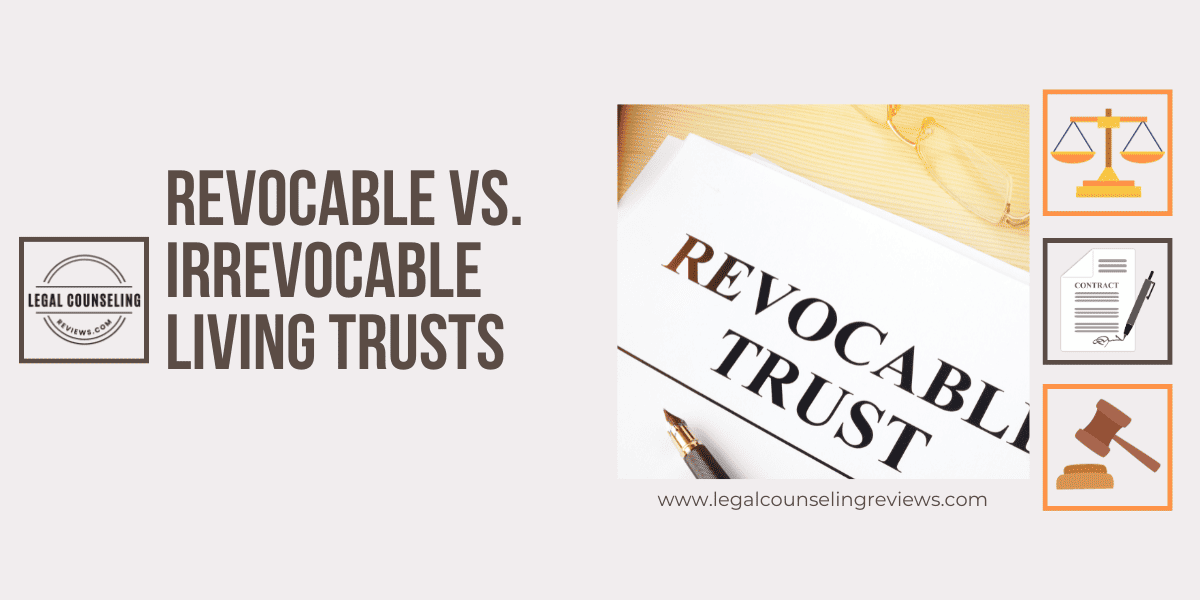Whether you want to admit it or not, we are all going to reach a point in our lives when we have to start thinking about the future. It naturally implies thinking of what we can do with our assets. And this is where estate law steps in.
People mainly opt out for a will. But not many know that there is another way to make sure that every single item in your possession can be protected – trusts.
There are some instances when we can’t prolong the wait for the results that come with a will. In these cases, trusts are where we seek shelter. It’s actually a very intriguing concept.
So, if you are looking to learn something more about trusts – especially revocable vs irrevocable living trusts, then you’ve come to the right place!
Revocable vs. Irrevocable Living Trusts
Trusts are one of the tools in Estate planning that help you protect your assets. Actually, these are considered legal entities because they “own” your belongings. The moment you sign the trust it becomes the holder of your possessions, which are managed by a trustee.
The key point with trusts is that you don’t have to wait for them to take legal effect after your passing. In other words, the moment you create trust it immediately enters into force.
Now, the process complicates when we meet the main types of trust: revocable vs irrevocable trust.
A revocable trust, also known as a living trust or inter vivos trust, is a type of trust that is exactly what its name suggests – it can be revoked by the creator i.e. Grantor, at any time.
An irrevocable trust is quite the opposite. The moment this trust is created, it becomes binding and cannot be changed anymore. The only exception is if all beneficiaries agree to the change, or if the change is mandatory under a court order.
Revocable vs Irrevocable Trust: Key Differences
The biggest difference between revocable and non-revocable trust is whether the Grantor can or can not alter, add, erase or make other changes in the already signed trust.
Of course, this is not the only thing that separates these types. Below is a list of the revocable vs irrevocable trust pros and cons. It can also aid when you want to distinguish revocable vs irrevocable living trusts:
Revocable Trust Pros and Cons
Revocable Trust Pros
- Keeps your privacy;
- Avoids probate;
- Grantor keeps control over their assets;
Revocable Trust Cons
- Creditors and taxes will still reach your assets
Irrevocable Trust Pros and Cons
Irrevocable Trust Pros
- Tax reduction;
- Creditors can’t dip into your belongings;
- Keeps your privacy;
- Avoids probate
Irrevocable Trust Cons
- Grantor has no control over their assets
- More complicated than the revocable trust
- The trustee has all the power
What is the Difference Between Irrevocable vs Revocable Trust?
As stated earlier, the main difference is whether the Grantor can modify the trust. In the revocable trust, they can change the trust at any given time – even turn the revocable to an irrevocable trust.
On the other hand, the Grantor can’t change the irrevocable trust. Once the documents for this type of trust have been constructed and signed, the Grantor is no longer an active figure in this play.
Another important distinction is who owns the property. A revocable trust allows the Grantor to still have control over his belongings – even after he has assigned them to a trust.
But the irrevocable trust does no such thing. The Grantor has no control over their assets because they are permanently given to the trustee and beneficiaries.
This leads to the third key difference – protection over the assets. This protection comes from creditors but it also refers to a more attractive topic – revocable vs irrevocable trust taxes.
Seeing that with the revocable trust, the Grantor is still in “possession” of his assets, that, of course, means that creditors can still make claims from them. And taxes will definitely be added to them, too. But, with an irrevocable trust, this is not an issue. Federal taxes, as well as creditors, can’t get to them.
Revocable vs Irrevocable Trust: Which is Right for You?
When first reading about these two types, you will probably think that in the battle of revocable living trust vs irrevocable – revocable triumphs. But our advice is to think twice before jumping to any conclusions.
You see, both of these have their strengths and weaknesses. Most of the time, people pick the irrevocable trust because of its haven-like abilities. But, the fact that you can’t change what has already been stipulated in the trust document, and the fact that your assets are literally not yours anymore is what makes everyone question it.
Yes, a revocable trust gives you access to your assets, but they will not be protected as well as those in an irrevocable trust. Another point is that you can always turn the revocable to irrevocable trust, or change it in any other way you want.
Which One is Better, Irrevocable or Revocable Trust?
Deciding which trust to go for can be overwhelming. You will hear different opinions every time. Take one of the most famous financial advisors in the US – Suze Orman, who actually praises the revocable trust.
But, the end decision still comes down to what you want and need. Let’s say you want to set aside some cash for your children. You can easily do this with a revocable trust fund, but you have to bear in mind that creditors and the IRS can still get to them.
On the contrary, if you want to avoid owing federal estate taxes – which are placed on an estate larger than $22 million – or just “keep your money safe”, irrevocable trusts are your go-to type.
Despite our Revocable vs. Irrevocable Living Trusts review, the fact still remains: trusts are more complex than what we covered here. When you decide that the time has come to enter this world, we definitely advise finding and consulting with a good trust lawyer who understands revocable vs irrevocable living trusts.
Author

Raymond Hickman is a distinguished lawyer, writer, and legal commentator with extensive experience in various areas of law. He is widely recognized for his exceptional legal knowledge, insightful analysis, and engaging writing style, which have earned him a reputation as a leading voice in the legal profession.With his exceptional legal expertise, insightful analysis, and engaging writing style, Mr. Hickman has earned a reputation as a leading authority in the legal profession. His contributions to the field of law have been recognized by his peers, clients, and the wider legal community, making him a valuable resource for anyone seeking legal advice or insight.








